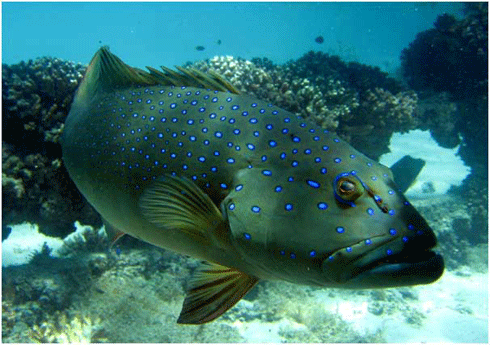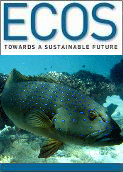
|
Published: 18 June 2012
Marine reserves provide baby bonus to fisheries
An international team of scientists has gathered the first conclusive evidence that marine reserves can help restock exploited fish populations on neighbouring reefs open to both commercial and recreational fishing.
The study was carried out in the Keppel Island group on Australia’s Great Barrier Reef by researchers from the ARC Centre of Excellence for Coral Reef Studies (CoECRS), in conjunction with other research institutions, and is reported in the latest issue of the journal Current Biology.
Its findings help to resolve a long-running debate in Australia and worldwide about whether marine reserves, areas closed to all forms of fishing, can help to replenish fish numbers in areas left open to fishing.
Using DNA fingerprinting technology, the team of scientists tracked the dispersal pathways of baby coral trout and stripey snappers from the marine reserves in the Keppel island group where they were spawned. They found that a very large proportion of baby fish settled on reefs in areas that are open to fishing, up to 30 kms from the place they were spawned. Most of the baby fish settled within 1-5 kms of reserves but a significant proportion dispersed 10 kms or more to find a new home.
‘We found that the marine reserves, which cover about 28 percent of the 700 hectare reef area of the Keppels, had in fact generated half the baby fish, both inside and outside of the reserves,’ says lead author Hugo Harrison, of CoECRS and James Cook University.
‘We’ve known for some time that if you close an area of reef to fishing, both fish numbers and sizes within the reserve increase. But the fate of the offspring of fish in the reserves has been a long-standing mystery. Now we can clearly show that the benefits of reserves spread beyond reserve boundaries, providing a baby bonus to fisheries,’ says team leader Prof. Geoff Jones.
The research establishes proof-of-concept for the idea that setting aside networks of marine reserves within a larger managed ecosystem like the Great Barrier Reef Marine Park, can simultaneously provide significant fishery and conservation benefits.
Local recreational fishers worked with the research team to sample adult fish populations within the reserves.
‘Local fishers who assisted in the project have been keenly anticipating the results for some time,’ says Bill Sawynok, recreational fishing sector representative and manager of the CapReef program, a monitoring program involving local fishers.
‘Networks of marine reserves on coral reefs are a central strategy for ensuring food security for millions of people in the Coral Triangle region, just to the north of Australia,’ says Professor Garry Russ, study co-author.
‘This study in the Keppel Islands, for the first time, demonstrates that reserve networks can contribute substantially to the long-term sustainability of coral reef fisheries, and thus to food security and livelihoods in the region.’
Source: The ARC Centre of Excellence for Coral Reef Studies




